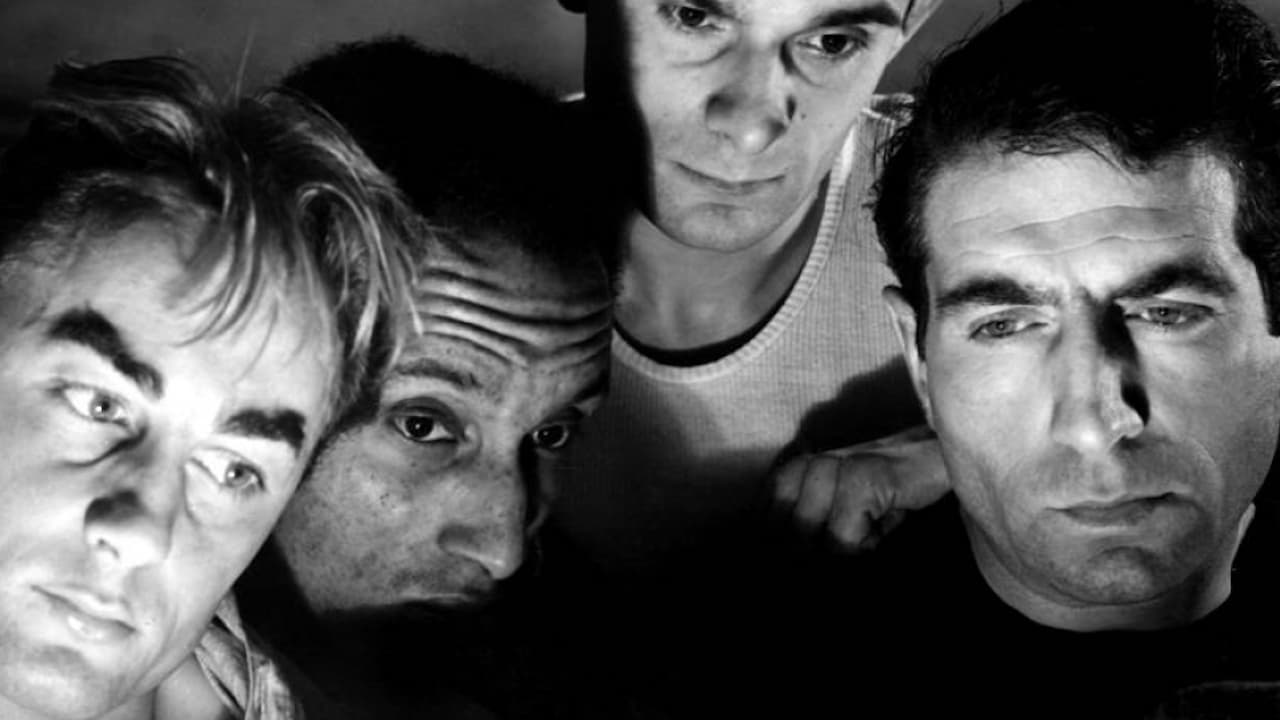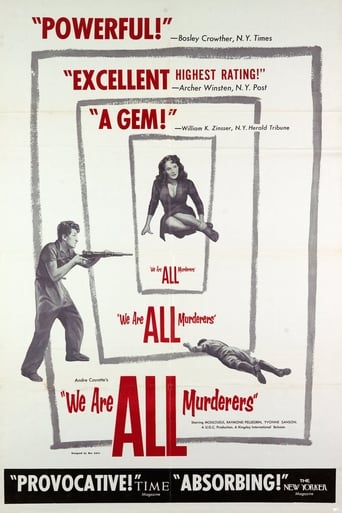

It's not beyond the bounds of credibility that Ken Loach genuflects to Andre Cayatte morning noon and night because Cayatte was baring his bleeding heart when Loach was still squirreling his deep hatred of England in his subconscious awaiting release via a non-stop string of celluloid attacks on the terrible country where he is still happy to live. Unlike Loach Cayatte knew how to entertain as well as preach and spent the bulk of the 1940s giving the public the lift it needed to counter the War news. After making five films for Continental between 1942 and 1943 he teamed with Jacques Prevert to make the best of his entertainments by a country mile, Les Amants de Verone and then turned his attention to addressing social problems with this title being possibly the finest of them all. Being the craftsman that Loach is not Cayette is content to spend a couple of reels introducing his lead character whose background in a dysfunctional family makes him an ideal candidate for the Resistance to groom into a first-class killer. The problem is, of course, that once peace breaks out he is unable and/or unwilling to stop killing and inevitably is caught, tried and condemned. And this, as they say, is where the story really starts for in the condemned cell Cayatte is able both to record and register his contempt for the Penal system that still obtained in the early fifties; a system possibly unparalleled for a total lack of humanity that verged on the barbarous, one in which the condemned were given absolutely no warning of execution but merely 'surprised' in the night, manhandled out of the cell with a platitudinous Gallic equivalent of 'chin up'. Only in the daylight hours are the condemned sure of a brief respite. Cayette has turned out a masterly film which is at once harrowing to watch yet compulsive viewing.
... View MoreIn World War II, the illiterate, starving and alcoholic twenty years old René Le Guen (Marcel Mouloudji) fights to survive and lives with his dysfunctional family in a slum. The French Resistance invites and teaches him to kill Germans and traitors. When the war ends, he continues to kill and is arrested, judged and sentenced to death in the guillotine. While in prison waiting for a possible presidential pardon claimed by his lawyer, he meets other prisoners also waiting for the dishonored death."Nous Sommes Tous des Assassins" is the most impressive movie against capital sentence that I have ever seen. The lawyer André Cayatte wrote and directed this film where the defendant is actually the hypocrisy of the whole society, the church and the justice system. He does not spare the prejudgment and behavior of every social class, mostly the dominant class, to defend his opinion about the lack of humanity in the French prisons for the prisoners waiting for the executioner. In my country, we do not have capital sentence, but in my opinion this great movie is manipulative, using very sad and unfair examples to justify the position of the author. I agree that children and those that need should be assisted by the State but in spite of being fruit of the society, criminals destroy families and must pay for their crime the same way the families grieve their beloved loss. My vote is eight.Title (Brazil): "Somos Todos Assassinos" ("We Are All Assassins")
... View MoreThat was the second film dealing with justice in France in Cayatte's long career (1942-1978).François Truffaut was always putting him down,but won't you forget ,for a while,the new wavelet and their notorious fusty Cahiers du Cinema ?Cayatte is a name to be reckoned with.If Richard Pottier("Meurtres" ) tackled euthanasia the same year (1950) as he did ("Justice est Faite")Cayatte was the first in France (and in the world?) to devote an entire film to express his disgust of death penalty.Think of it! It was 1952!It took a lot of guts and a lot of faith to dare such a thing at a time when lex talionis and punishing the criminal as a deterrent to others were the golden rules."What example?" the doctors says "the executions were no longer public as if they were ashamed of what they did" The first part of the movie may seem weak by today's standards .But it's necessary to introduce René (a never better Marcel Mouloudji)and his background.In his own particular way,he predates Malle's "Lacombe Lucien" hero .One fights for the Resistance,and the other is a collaborator.But both are ignorant poor -René is even illiterate .René lives in a place where "dump" is too beautiful a word.His mother is a shrew who has always had one too many;his sister has been a whore since she was twelve ;his little brother is bound to be a delinquent. Another man sentenced to death has killed his baby girl: but he was exhausted after a hard day of work and as he couldn't sleep because his daughter was crying in their tiny flat he lost his mind.Not a judge can comprehend.Only a woman in a cafe knows better:if that man had been decently housed -just have a look at the lawyer's bourgeois parents' luxury house ,where's there's a "golden dish with every wish"- nothing would have happened cause that depressed man was a good father.Cayatte puts the whole society on trial,particularly the bourgeois (the lawyer's father just looks up and pretends that he does not see when his son brings the little brother home)In his next movie,"Avant le Deluge" which is to be recommended ,Cayatte would denounce the bourgeois who do not know of the meaning of the word "responsibility".By its second part ,the movie becomes almost unbearable,even today.Cayatte wanted his movie to be so.Nothing is spared the viewer: the condemned persons cell,where in the small hours they suddenly become frightened :is this dawn THE dawn?Will THEY come?Is IT in the prison? ( the word "guillotine " is never uttered ).Cayatte's directing becomes masterful when he depicts the corridor where a secret ceremony happens early early in the morning.Those men in grey suddenly enter the room and sweetly say "it's your turn ,son!arm up with courage!"As often in Cayatte's work ,the screenplay is a bit muddled (the Corse episode is a bit too much,but at least it allows us to see great actress Madame Sylvie in two too brief scenes)but until the very end his "hope against hope" will not leave him down.As the lawyer waits for an eventual President's pardon for René ,there's a moving tracking in on his little brother's face .Cayatte does not want to comfort his audience,and this conclusion is the best he could think of.Time has passed.In 1981,François Mitterrand abolished death penalty in France.One should never forget that men like Cayatte helped along the way .His movie was certainly as important as any of Godard's farces.Like this?try these....I want to live (Robert Wise,1958)La vie,l'amour ,la mort (Claude Lelouch,1969)Deux hommes dans la ville (Jose Giovanni,1972)Le pullover rouge (Michel Drach,1979)Dead man walking (Tim Robbins ,1996)
... View MoreThough his later color RISQUES DU METIER and LE VERDICT come close, this is the best of lawyer/film maker Cayatte's ciné-tracts, a grim, plausible and involving attack on the guillotining of prisoners. With a few digressions (AMANTS DU VERONNE, CHEMINS DE KHATMANDOU) the director devoted his career to the iniquities of the French legal system and French society reflected by it. Imagine a preachier, French Sidney Lumet.A disparate group of prisoners lie in the condemned cell, waiting in the dark to be dragged to their execution. Only when the sun comes up do they sleep.Pellegrin is the nearest thing to a star, though Balpêtre is a familiar character face (Le COURBEAU) who was in JOURNAL D'UN CURÉ DE COMPAGNE with Claude Leydu. We get their back stories but the inhuman prison routine is far more involving.This is a deeply disturbing film, probably the most convincing of the Cayatte collection, and it works as rather severe entertainment too. It certainly should be more widely seen. Imagine this on a double with the Yilmaz Guney film LE MUR which covers the same ground.
... View More